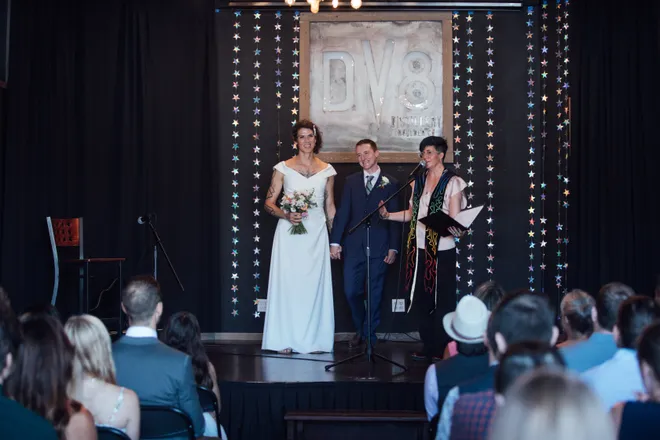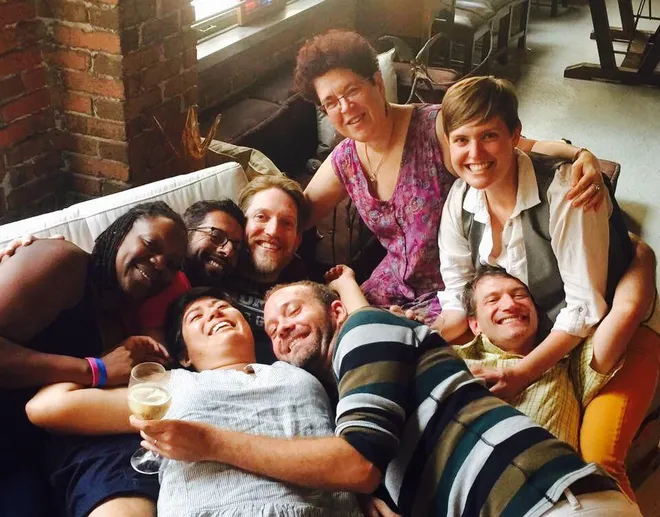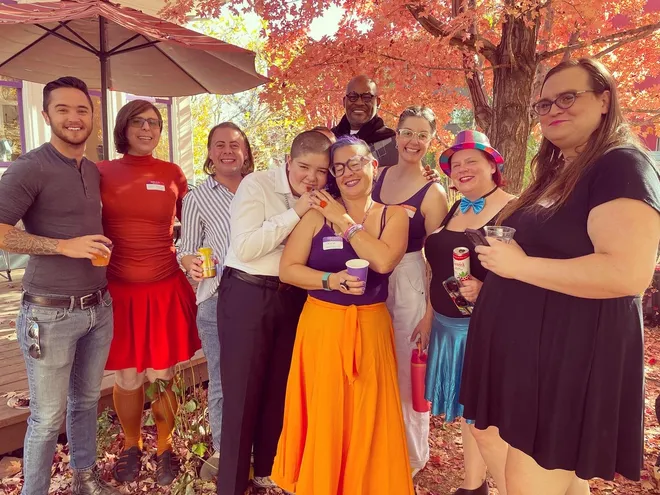Amid ‘unicorn hunters’ and stereotypes, here’s how bisexual people are finding support
Three Brodsky didn’t know a lot of bisexual people growing up. So when she came out as a 37-year-old, she wondered, “Where are all the bi people?”
And then she realized they were everywhere, living around her. She just didn't know they were bisexual. Now eight years later, she runs Bconnected, a bisexual and queer social group in Colorado with about 2,400 members.
The bisexual community makes up 58% of LGBTQ-identifying adults, but they’re far less likely to be out to people in their lives than gay or lesbian adults. So when they do come out, where do they find community?
'Biphobia' and combatting stereotypes
Brodsky began on Meetup, a social platform where many bisexual community groups get their start with a mission: Get bisexual people in a room and see what happens. Excited for conversation and bonding about the experience of being bisexual, she was discouraged when she tried to book a bar space and an employee told her it sounded like a “sketchy vibe.”
This view comes from a long line of stereotypes about bisexual people – that they’re distrustful, greedy, or sexually promiscuous.
Stereotypes, discrimination, or what’s known as “biphobia” is what makes these community spaces for bisexual-identifying folks so crucial, Brodsky says. There’s no “one way,” of being bisexual. The umbrella term “bi+,” which includes bisexual, pansexual, queer, fluid, or other, unlabeled identities, can include a variety of sexual and romantic expressions that even change over the course of an individual’s life.
“To create culture and to connect with each other’s stories and say, ‘Here’s how I’m being bi. How are you being bi?’ … versus trying to blend in with straight culture or trying to blend in with gay culture,” Brodsky says.
Bconnected spans most of the area around Denver and just several cities outside of it. The group hosts sit-down conversations, but they also do hikes, game nights, arts and crafts, skiing, brunches and even blacksmith classes.
The group has also facilitated lasting friendships and relationships. Sam and Brie Tynen met at a Bconnected game night in 2017 – they got married last year.
Brie and Sam Tynen’s wedding, officiated by Bconnected founder Three Brodsky, right. Courtesy of Brie and Sam Tynen
Creating community out of need
The Bisexual Resource Center connects the bisexual-plus community through resources, support and celebration. Courtesy of Jessica Podkalicki, BRC
Bisexual Resource Center, the oldest nationally-focused bisexual organization in the U.S., has become a de facto hub for bi culture.
According to Jessica Podkalicki, Bisexual Resource Center’s program and operations coordinator, part of the group's mission is to offer advice to those who don’t know where to start. Team members are open to workshopping community-building initiatives on the phone or via email, and they have a “Find a Bi+ Group” page where they promote local groups.
Ian Lawrence-Tourinho, the head of amBi network, originally joined the Los Angeles chapter of the social group after moving from San Diego and leaving behind the thriving bisexual community he found there.
In Los Angeles, he eventually discovered the floundering amBi group on the brink of disbanding. So he took over the group in 2010 and built it up. Today, amBi is an international network with 24 chapters across five continents.
“I see so many friendships come together out of amBi groups, and then people wind up doing other things outside of what the chapter does,” Lawrence-Tourinho says, “I’m just so happy because that’s one of the things that biphobia, bi invisibility robs us of – that kind of connection and affirmation and networking.”
amBi members gather together during an event. Courtesy of amBi Bi Social Network
Bisexual groups are also born out of niche – when Casey Abbott read “Greedy: Notes from a Bisexual Who Wants Too Much,” she was at first disappointed she didn’t have anyone to talk to about it. Then she realized as a librarian at the Boston Public Library, she had the power to create that space and she started “Book Bi Book,” which meets monthly.
“I’ve had both straight and queer people tell me that bi people don’t exist and that being bi is just a stepping stone to being a lesbian,” Abbott says. “That’s exhausting."
Free from 'unicorn hunters' and being sexualized
Bisexual groups also offer a refuge from oversexualizing bisexuality – both amBi and Bconnected specify that their groups are not for dating or hookups. Some of the most persistent stereotypes about bisexuals are that they're sexually promiscuous, incapable of monogamy, or more likely to cheat on their partners. Bisexual women, in particular, are also often fetishized, with their sexuality being seen as a "party girl phase" or existing for the pleasure of straight men.
Bconnected member Bethany Sprague told USA TODAY she appreciates having a space that's free from “unicorn hunters” – couples looking to experiment sexually with a bisexual person.
"There's plenty of dating that goes on, but that isn't the focus," Sprague says. "I'm not going to some sort of meat market where it's like 'Ooh, there's new bisexuals to hook up with.'"
‘It just feels like home’
In addition to being a place to meet other bisexual people, bisexual community groups offer a rare chance for bisexual-identifying to be completely themselves. When Kristin Robbins first found Bconnected six years ago, she said it felt like the first time she had ever been seen as a queer person.
“This group gave me the courage to be out,” she says. “It just feels like home.”
Brodsky says she’s designed Bconnected to be accepting of the “flowy energy” of being under the bisexual-plus umbrella – an acknowledgment of the fluidity of sexuality, but also gender expression.
“I always describe it as a safe place to be creative with my own expression, with my own exploration of my own gender, my own sexuality,” says Brie Tynen, who is trans. “A lot of people have changed their names, changed their pronouns … you can be creative with this group and you change your name and everybody’s immediately got it.”
Bconnected members at a group event. Courtesy of Three Brodsky
How can the bisexual community grow?
Part of AmBi’s mission is creating a community space not centered around activism. Lawrence-Tourinho says that’s a distinction all bisexual community spaces should make, and that folks should come to terms with what their bisexuality means to them before diving into activism. There is joy to be found in your bi identity outside of the outward-facing disparities, he says.
“Even if officially we’re not activists, I think we’re directly taking on the disparities head-on,” Lawrence-Tourinho says.
In Brodsky’s eyes, the bisexual community is responsible for its own visibility.
In the past seven years, Bconnected has taken on a degree of mentorship as a place for people in all stages of their bi journey – folks who have been out for 20 years and folks who have been out for 20 days.
“So many bis I meet have this insecurity, like imposter syndrome, like ‘I’m not queer enough,’ ‘I have couple privilege,’ ‘I’m married to a straight male,’” Brodsky says. “You’ve got to shake those feelings off and own it.”




